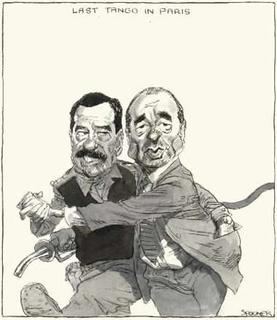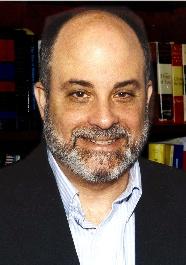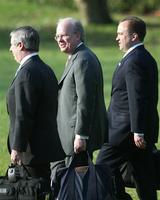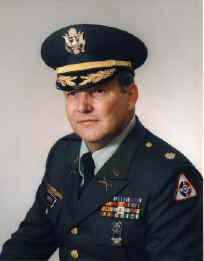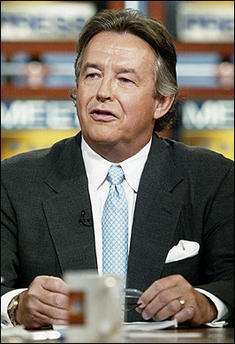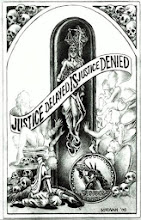 John G. Roberts in his own words
John G. Roberts in his own wordsWhen President Bush nominated John Roberts to the U.S. Court of Appeals for the District of Columbia, Roberts testified twice before the Senate Judiciary Committee in 2003 and responded to written questions from its members. Here are a few of his exchanges with liberal Democratic Senators Dianne Feinstein (Calif.) and Teddy Kennedy (Mass.).
On the ‘Right to Privacy’
Sen. Dianne Feinstein (D.-Calif.): In Griswold v. Connecticut, the Supreme Court recognized the constitutional right to privacy. It went on to reaffirm and expand on this right in Eisenstandt v. Baird. Following from these decisions, the Supreme Court then recognized constitutional protections for a woman’s right to choose in Roe v. Wade. (a) Do you believe in and support a constitutional right to privacy? (b) Please explain your understanding of a constitutional right to privacy? (c) Do you believe a constitutional right to privacy encompasses a women’s right to have an abortion?
Roberts: If confirmed as a circuit judge, I would be bound by Supreme Court precedent recognizing the constitutional right to privacy. Nothing in my personal views or beliefs would prevent me from applying that precedent fully and faithfully.
The Supreme Court’s cases have recognized the right to privacy in a variety of contexts. The court explained in Griswold v. Connecticut that the 1st Amendment “has a penumbra where privacy is protected from governmental intrusion.” Even before Griswold, the 1st Amendment had been construed to protect, among other things, the “freedom to associate and privacy of one’s associations.” Griswold further observed that other constitutional amendments—the 3rd, 4th, and 5th, supported by the 9th—similarly created “zones of privacy” protected from “governmental invasions.” The Griswold court held that the state law at issue there—which forbade the use of contraceptives—concerned “a relationship lying within the zone of privacy created by several constitutional guarantees,” and improperly “sought to achieve its goals by means of having a maximum destructive impact upon that relationship.” The court accordingly held the law unconstitutional.
The court in Eisenstadt v. Baird invoked Griswold in striking down, as a violation of the Equal Protection Clause, a state law permitting married couples to obtain contraception but forbidding single people to do the same. The court stated in Eisenstadt that “[i]f this right of privacy means anything, it is the right of the individual, married or single, to be free from unwarranted governmental intrusion into matters so fundamentally affecting a person as the decision whether to bear or beget a child.”
In Roe v. Wade, the court stated that “[t]he Constitution does not explicitly mention any right to privacy. In a line of decisions, however, going back perhaps as far as Union Pacific R. Co. v. Botsford, the court has recognized that a right of personal privacy, or a guarantee of certain areas or zones of privacy, does exist under the Constitution.” The Roe court further observed “the right has some extension to activities relating to marriage … procreation … contraception … family relationships … and child rearing and education.” The court concluded in Roe that “[t]his right of privacy, whether it be founded in the 14th Amendment’s concept of personal liberty and restrictions on state action, as we feel it is, or ...in the 9th Amendment’s reservation of rights to the people, is broad enough to encompass a women’s decision whether or not to terminate her pregnancy.”
And in Planned Parenthood v. Casey, the court observed that “[i]t is settled now, as it was when the court heard arguments in Roe v. Wade, that the Constitution places limits on a state’s right to interfere with a person’s most basic decisions about family and parenthood.”
Feinstein: In Rust v. Sullivan, even though the question before the Supreme Court involved government funding for family planning services, you argued in a brief as deputy solicitor general that “[w]e should continue to believe that Roe was wrongly decided and should be overruled.” You further argued that “the court’s conclusions in Roe...find no support in the text, structure, or history of the Constitution.” (a) Mr. Roberts, do you continue to believe that Roe was wrongly decided? (b) Do you continue to believe that Roe should be overruled? (c) Do you continue to believe that the Supreme Court’s decision in Roe has no support in the text, structure or history of the Constitution? (d) Do you believe that Roe v. Wade is the settled law of the land?
Roberts: I do not believe that it is proper to infer a lawyer’s personal views or beliefs from the arguments advanced by that lawyer on behalf of a client. The argument advanced in the Rust brief reflected the existing position of the federal government, as reflected in briefs filed in five previous cases. The Rust brief noted that the views expressed in those briefs continued to be the position of the administration. If that position were accepted, the challenge to the federal program in Rust would fail, which was why the position was noted in that case by the attorneys charged with responsibility to defend the challenged federal program.
Roe is the settled law of the land. If I am confirmed as a circuit judge, I would be bound to follow it. Nothing about my personal beliefs would prevent me from doing so.
—Answers to written questions, Feb. 5, 2003
On Liberal Judicial Activism
Sen. Edward (Teddy) Kennedy (D.-Mass.): . . . .Do you think there has been judicial activism on both sides of the [liberal/conservative] spectrum? . . . And, if so, how would you define that?
Roberts: Well, I do think there has been judicial activism on both sides. I haven’t given any thought to a particular Supreme Court case that I thought exhibited liberal judicial activism. Again, I feel reluctant to criticize pending or binding [Supreme Court opinions].
—Testimony, April 30, 2003
On Advocating Both Sides of an Issue
Kennedy: . . . [Y]ou are talking you would be a non-judicial activist, and we’re trying to find out what these words mean in terms of your own kind of life experience, either by your writings, your statements or your opinions about this, and that I think we are entitled to find out.
Roberts: I guess what I would point to, Senator—I’m obviously not a sitting judge. I don’t have decisions — but I do have a history of litigating cases, and when you talk about the ability to set aside personal views and apply precedent without regard to personal ideology or personal views, that’s something I’ve been able to do in my practice.
My practice has not been ideological in any sense. My clients and their positions are liberal and conservative across the board. I have argued in favor of environmental restrictions and against takings claims. I have argued in favor of affirmative action. I’ve argued in favor of prisoners’ rights under the 8th Amendment. I’ve argued in favor of antitrust enforcement.
At the same time, I’ve represented defendants charged with anti-trust cases. I’ve argued cases against affirmative action. And what I have been able to do in each of those cases is set aside any personal views and discharge the professional obligation of an advocate.
And I would argue you look at cases on both sides. Look at the brief, look at the argument where I was arguing the pro-environmental position. Take a brief and an argument where I was against environmental enforcement on behalf of a client. See if the professional skills applied, the zealous advocacy is any different in either of those cases. I would submit to you that it is not.
Now, that’s not judging, I understand that, but it is the same skill, setting aside personal views, taking the precedents and applying them either as an advocate or as a judge.
—Testimony, April 30, 2003

